The 19th annual Docaviv Festival will take place from May 11 – 20, 2017. Thirteen documentaries will premiere in the Israeli Competition, selected from among 75 submissions, selected by a panel that included Karin Rivkind Segal, Docaviv’s Artistic Director; director and editor Ayal Goldberg (“Powder”, 2012; “Rita Jahan Foruz”, 2013); and director Gili Gaon. Six films will participate in the Student Film Competition. Outside the Box, a project of the Gesher Film Foundation, Keshet TV, and Docaviv, will feature Dafni Leef’s film of her experiences during the 2011 social protests: Before My Feet Touch the Ground. Anat Even’s Fuck History… was chosen to participate in the Master’s Program, while additional Israeli documentaries will be shown in the context of the Panorama Program and others. The festival will take place at Tel Aviv Cinematheque, as well as Slope Park in Jaffa, Ha’bima Square, Levinsky Park, Beit Dani, and Beit Romano. The following list and film descriptions of Israeli Films participating in Docaviv 2017 was provided by the Docaviv Festival.
Israeli Competition
The Sign for Love – Directors: Elad Cohen, Iris Ben Moshe; Producer: Nati Adler; Israel, 2017
El-Ad was born deaf to a hearing family. While dealing with the tragic death of his mother and the breakdown of his nuclear family, El-Ad finds a new family, one that speaks his (sign) language, and makes the most important decision of his life: to become a father.
My Beloved Country – By: Yael Kipper, Ronen Zaretzky and Sara Shilo; Directors: Yael Kipper, Ronen Zaretzky; Producer: Yael Kipper; Israel, 2017
A group of young people who have left their homes in the Indian state of Manipur, by the border with Myanmar; Two Lebanese-born girls who are now about to graduate high school; and one woman, a piano teacher, who grew up on the banks of the Volga. A literary-documentary journey into block 461 in the Israeli town of Ma’alot.
In My Room – Director: Ayelet Albenda; Producer: Naama Pyritz; Israel, 2017
The coming-of-age story of six young people, told only through self-shot footage they uploaded to YouTube. Their video diaries allow the viewer to gently and gradually experience their journey into adulthood, as revealed within their own bedrooms.
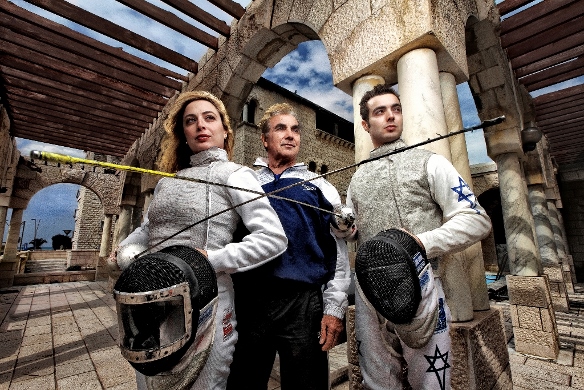
Fence Your Best – Director and Producer: Liat Mer; Israel, 2017
The story of the Hatuel family, Acre’s famous fencing dynasty. Right before the Olympic Games, paterfamilias and trainer Haim starts to lose control of his kids. The family members embark on a duel, where they jab at each other inside and outside the ring.
Elish’s Notebooks – Director: Golan Rise; Producers: Haggai Arad, Elad Peleg; Israel, 2017
After the death of Elisheva Rise, her children go through her belongings and find the diaries she secretly kept for each of them. The seven children, whom she had never hugged or kissed, read their mother’s documentation of their lives for the first time.
The Patriot – Director: Daniel Sivan; Producers: Zafrir Kochanovsky, Ina Fichman, Miri Ezra; Israel/Canada, 2017
With antisemitism on the rise in France, a militant Zionist hacker decides to take the law into his own hands, and declares war on the leaders of the antisemitic movement. What starts as cyber attacks turns into a dark journey of revenge, where the lines between good and evil, virtual and tangible, become blurred.
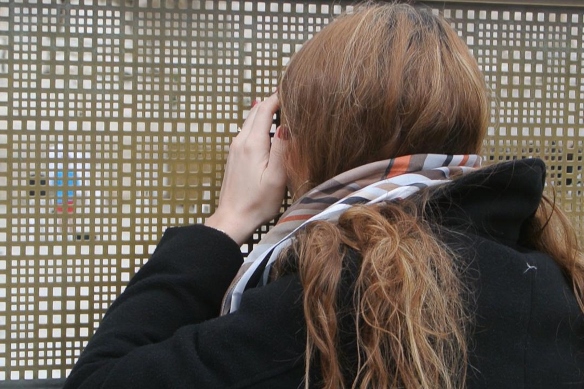
Wall – Director: Moran Ifergan; Producers: Michal Weits, Moran Ifergan; Israel, 2017
A woman ends her short-lived marriage and escapes to the women’s section at the Western Wall, where she documents her personal life, and the goings-on there, for a whole year. A dual portrait of a place, and of a woman. A meeting of sound and image, of the personal and the public, of God and His absence.
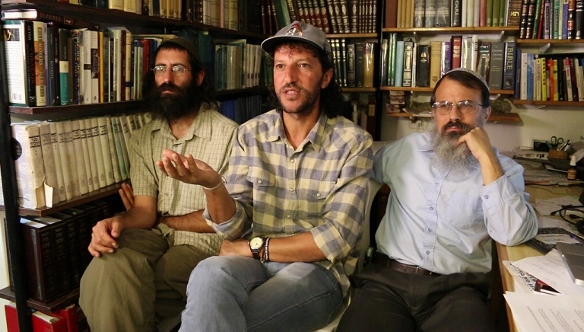
The Field – Director and Producer: Mordechai Vardi; Israel, 2017
Near the Gush Etzion Junction, between Jerusalem and Hebron, Palestinians and Jewish settlers start “Roots”, a local initiative for dialog between the two sides. They decide to take responsibility, and promote a change in consciousness that will bring about a political solution. When the junction becomes a hotbed of terrorist attacks, the local unrest threatens to undermine the project.
Stains – Director and Producer: Ekaterina Diakova; Israel, 2017
The film’s director sets out to document the father who abandoned her. What starts with accusations leads to the rediscovery of a hidden part of the father’s past. The story reflects the dissolution of the Soviet man after the dissolution of the Soviet Union.
The Promised – Director: Anat Schwartz; Producers: Anat Schwartz, Ronen Ben Tal; Israel, 2017
About 100,000 French Jews have emigrated to Israel in the last decade. After following three émigré stories for five years, The Promised Land tells the stories of these “olim”, who dreamed of the Promised Land, and got Israel, drawing a French-accented story of the Zionistic dream and its downfall.
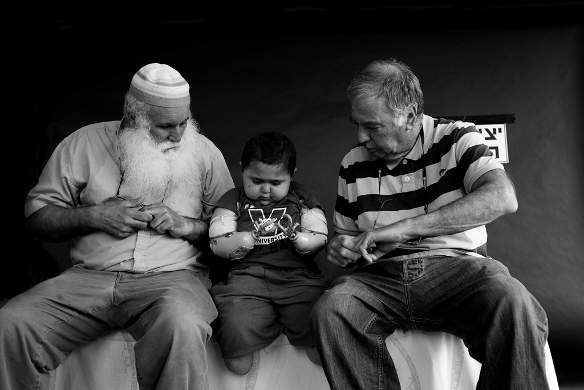
Muhi – Generally Temporary – Directors: Rina Castelnuovo-Hollander, Tamir Elterman; Producer: Hilla Medalia; Israel/Germany, 2017
For seven years, Muhi, an endearing Palestinian boy, has been living at Tel Hashomer Hospital. It is the only home he’s ever known, and he cannot return to his family in Gaza. Muhi is growing up surrounded by Jews and Arabs who transcend identity, religion, and the conflict that’s tearing his world apart.
Hope I’m in the Frame – Director and Producer: Netalie Braun; Israel, 2017
The story of filmmaker and actress Michal Bat Adam, who was ahead of her time and challenged the Israeli film industry in the areas of ideology and gender.
The Ancestral Sin – By: David Deri, Doron Galezer and Ruth Yuval; Director: David Deri; Producers: David Deri, Sarit Shalom; Israel, 2017
The story of Israel’s so-called “development cities”, as never before told: confidential testimonies and protocols reveal the shocking truth behind the principle of “population dispersal”, as espoused by Israel’s leadership in its first two decades, which laid the foundations for the country’s ethnic and class gaps.
Student Film Competition
The Island – Director and Producer: Adam Weingrod; Steve Tisch School of Film and Television, Tel Aviv University; Israel, 2016
In central Jerusalem, on the tense line between East and West, near the walls of the Old City, sits the French St. Louis Hospital, a hospice for terminal patients. The film provides an intimate look at the patients and the staff, who come there from all over the city.
Timor’s Show – Director and Producer: Tamara Mamon; Sam Spiegel School of Film and Television; Israel, 2016
Timor, an opera singer, decides, for the first time in his life, to confront his mother, a respected Georgian opera critic who has no faith in his abilities. Together with his voice coach Ella, he puts on the show of his dreams.
Like a Lotus Flower – Director: Eliya Swarttz; Producers: Eliya Swarttz, Dean Baram, Lior Vainshtein; Minshar School of Art; Israel, 2016
Within the memory of a ten-year-old girl, there were six grown-ups. They were a family. She remembers their voices when they were still young. Today she remembers them a little differently. Through her diaries, she tries to come to terms with her family’s breakdown following the death of her mother.
Turn Over the Stones – Director: Nir Dvortchin; Producers: Nir Dvortchin, Hila Amir; Sapir Academic College; Israel, 2016
Sami’s moods change like the seasons. The years-long loneliness, longing, fear and hope, are reflected by the countless letters he keeps in a cardboard box in his room—all written for one recipient, one woman.
Foot Stretcher – Director and Producer: Inbar Hagai; Department of Fine Art, Bezalel Academy; Israel, 2017
In “Foot Stretcher”, a young artist documents herself after deciding to become a ballerina. She sets off on this futile quest at full steam.
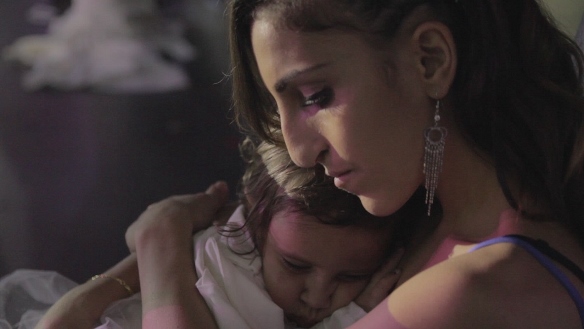
Keren Or (A Ray of Light) – Director and Producer: Lihi Sabag; Ma’aleh School of Television, Film & Arts; Israel, 2017
Michal, a young woman, former welfare child, former single mother, decides to raise her daughter Keren Or by herself. In her quest for independence, she encounters many unanticipated obstacles.
A Select List of additional Israeli Films at the Festival
Another Planet – Director: Amir Yatziv; Producers: Amir Yatziv and Jonathan Doweck; Israel/Germany/Belgium, 2017; Part of the Depth of Field Competition
An animated documentary about encounters within a virtual simulation of Auschwitz. The film follows the creators of the models—from Poland, Germany, and Israel—inside the virtual camps they’ve created, each for his own reasons. This is a journey deep into imagination and reconstructed memory, which exposes the obsessive desire to portray the Holocaust and the “other planet”.
“Fuck History…” – Director: Anat Even; Producers: Jean Bigo and Anat Even; Israel/France, 2017; Part of the Masters section
Layer by layer, the Menashiya neighborhood between Tel Aviv and Jaffa is uncovered. “Fuck History…” is about a disappearing place, whose existence is burned into the memories of its residents.
Before My Feet Touch the Ground – Director: Daphni Leef; Producers: Yael Abecassis, Hillel Roseman; Israel, 2017; Part of the Out of the Box section
The story of a film student who pitches a tent in the street to protest the rising cost of housing, not knowing that she was days away from becoming the leader of a mass social justice protest movement. The film is a first-person account of the hardships of leading a struggle, and what happens to a young woman, whose life revolves around images, when she herself becomes a symbol.
The Essential Link – the Story of Wilfrid Israel – Director: Yonatan Nir; Producers: Noam Shalev, Yonatan Nir; Israel, 2016; Part of the Panorama section
Wilfrid Israel was a rich German Jew who saved thousands of Jews’ lives. His life story leads director Yonatan Nir on a globetrotting research mission, which sheds new light on the saving of German Jews in the 1930s, as well as a dark hidden story from his own family history.
One Angry Vegan – Director: Gil Golan; Producer: Judith Manassen Ramon; Israel, 2017; Part of the Panorama section
The story of Tal Gilboa, a young leader who helped turn Israel, in just a few short years, into one of the world’s most vegan countries. The film follows her personal life over three years of activism, taking the viewer behind the scenes of Israel’s vegan revolution, and revealing the personal price of being a leader.
Shadows – Director: Noa Aharoni; Producers: Yoram Ivry, David Noy; Israel, 2017; Part of the Panorama section
The film tells a previously untold story about the secret kept by the children of Holocaust survivors, who were physically and emotionally victimized by their parents, themselves victims. The film’s protagonists break their silence for the first time, bravely dealing with the shadows of their past.
Mesila – Director and Producer: Amikam Goldman; Israel, 2017; Part of the Panorama section
The life of the migrant community and the unregulated kindergartens in southern Tel Aviv, as told through the eyes of social workers at Mesila, a civic center that functions as a municipal welfare office: Raising children in a life of poverty and cultural differences, while the kindergarteners’ lives are under constant threat.
The Italian Prisoner – Director: Ran Edelist; Producers: Yehuda Bitton, Ruth Diskin; Israel, 2016; Part of the Panorama section
Antonio Caeiro was a local legend. It was hard to miss this plainspoken tough guy, who was worlds apart from his German-born neighbors in the village. They knew he had been an Italian prisoner of war who joined the Irgun, that anyone who got in his way was in for a beating, and most of all, that he was a damn good farmer.
The Longings of Maya Gordon – Directors: Yair Lev, Etty Wieseltier; Producer: Etty Wieseltier; Israel, 2017; Part of the Art section
This tragicomic portrait of the artist as an aging wandering Jew was filmed over a decade in Israel, Poland, and The Netherlands. It follows Maya Gordon in her search for love and a home, and expresses her longings through her art.
One Last Bedtime Story – Directors: Anat Zeltser, Modi Bar-On; Producers: Orit Zamir, Yoav Roeh; Yes Doco; Israel, 2017; Part of the Art section
A journey through Israeli children’s literature. Prominent authors read their works, as well as stories that were read to them as children, and recall the experiences and emotions that they encapsulated. The series follows the way literature can form the identity of a child, as well as the identity of Israeli society as a whole. This will be the first episode’s world premiere screening.
Ron Arad (working title) – Director: Avida Livny; Producer: Gidi Avivi; Israel, 2017; Part of the Art section
While his 95-year-old father lives in Israel, and with his daughters leaving home, Ron Arad embarks on a journey into the past using crushed Fiat 500 cars.





